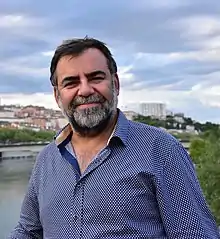Ricardo Baeza-Yates
Ricardo A. Baeza-Yates (born March 21, 1961) is a Chilean-Catalan computer scientist that currently is a research professor at the Institute for Experiential AI of Northeastern University in the Silicon Valley campus. He is also part-time professor at Universitat Pompeu Fabra in Barcelona and Universidad de Chile in Santiago. He is an expert member of the Global Partnership on Artificial Intelligence, a member of Spain's Advisory Council on AI, and a member of the Association for Computing Machinery's US Technology Policy Subcommittee on AI and Algorithms.
Ricardo Baeza-Yates | |
|---|---|
 | |
| Born | 1961 (age 61–62) |
| Alma mater | University of Waterloo University of Chile |
| Awards | ACM Fellow IEEE Fellow |
| Scientific career | |
| Fields | Computer science Data Science |
| Institutions | Northeastern University NTENT Yahoo! Labs Pompeu Fabra University University of Chile |
| Doctoral advisor | Gaston Gonnet |
| Website | www |
From June 2016 until June 2020 he was CTO of NTENT, a semantic search technology company.[1] Before, until February 2016, he was VP of Research for Yahoo! Labs, leading teams in United States, Europe and Latin America.[2]
He obtained a Ph.D. from the University of Waterloo with Efficient Text Searching, supervised by Gaston Gonnet and granted in 1989.[3]
His research interests include:
- Algorithms and data structures. His contributions[4] include algorithms for string search such as the Shift Or Algorithm and algorithms for Fuzzy string searching, inspiring[5] also the Bitap algorithm; co-author of the Handbook of Algorithms and Data Structures ISBN 0-201-14218-X with his former Ph.D. advisor Gaston Gonnet,
- Information retrieval. Co-author of Modern Information retrieval Addison Wesley, ISBN 0-201-39829-X, first edition in 1999 and a second edition in 2011 that won the 2012 book of the year award of the Association for Information Science and Technology.[6]
- Web search and mining. Baeza-Yates founded in 2002 and directed until 2005 the Center for Web Research in the Department of Computer Science of the University of Chile. His latest work on this area focuses on bias on the Web,[7] giving the Gödel Lecture 2017 in Viena.[8]
Dr. Baeza-Yates was awarded one of the Spanish national Computer Science awards in 2018[9] as well as the J.W. Graham Medal in Computing and Innovation by the University of Waterloo, Canada, in 2007. In August 2008, Dr. Baeza-Yates was proposed for the first time to the Chilean National Prize in Applied Sciences (Premio Nacional de Ciencias Aplicadas). He has been proposed again most of even years when this award is given. He is corresponding member of the Chilean Academy of Sciences (2003),[10] founding member of the Chilean Academy of Engineering (2010), and corresponding member of the Brazilian Academy of Sciences (2018). He is an ACM Fellow (2009).[11] and an IEEE Fellow (2011).[12]
References
- "Former Yahoo! Chief Research Scientist Joins NTENT". Business Wire. 7 July 2016. Retrieved 21 September 2016.
- Baker, Loren (23 January 2006). "Dr. Ricardo Baeza-Yates Leading Yahoo Labs in Chile & Spain". Search Engine Journal. Retrieved 21 September 2016.
- Ricardo A. Baeza-Yates at the Mathematics Genealogy Project
- "dblp: Ricardo A. Baeza-Yates". DBLP Computer Science Bibliography. Retrieved 21 September 2016.
- Baeza-Yates, Ricardo; Gonnet, Gaston (1992). "A New Approach to Text Searching". Communications of the ACM. 35 (10): 74–82. doi:10.1145/135239.135243. S2CID 207166926. (first Published at SIGIR 1989)
- "ASIS&T Book of the Year award winners". Association for Information Science and Technology. Retrieved 21 September 2016.
- Baeza-Yates, Ricardo (2018). "Bias on the Web". Communications of the ACM. 61 (6): 54–61. doi:10.1145/3209581. S2CID 44111303.
- Baeza-Yates, Ricardo, Gödel Lecture 2017: Bias in the Web
- News of the three 2018 national computer science awards of the Spanish CS Society
- Member profile, Chilean Academy of Sciences, retrieved 2013-02-14.
- ACM Fellow award citation, retrieved 2013-02-14.
- "Introducing the 2011 Fellows: The IEEE Fellows class for 2011 has been announced", The Institute, IEEE, 7 March 2011, archived from the original on 26 September 2013.
External links
- Official website
- Ricardo Baeza-Yates on LinkedIn
- Ricardo Baeza-Yates publications indexed by Google Scholar
- Publications in DBLP
- Website of Modern Information Retrieval, 2nd. edition, Addison Wesley, 2011
- Cómo funciona la web (2008) Full text in the Electronic Books Portal of the University of Chile